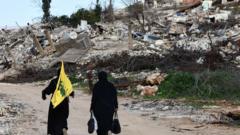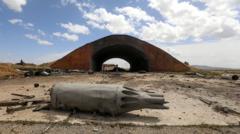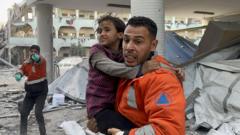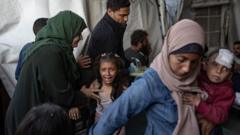The ongoing conflict in the Gaza Strip has prompted urgent evacuation orders from Israeli forces, intensifying an already dire situation for displaced Palestinians.
Israeli Military Urges New Evacuations in Gaza Amid Intensified Strikes

Israeli Military Urges New Evacuations in Gaza Amid Intensified Strikes
As strikes on civilian sites escalate, the Israeli military has called for increased evacuations in Gaza City.
The Israeli military has issued evacuation orders for multiple neighborhoods in Gaza City, exacerbating the humanitarian crisis as hostilities with Hamas continue to escalate. The decision follows reports from Palestinian health authorities indicating that recent airstrikes on a school turned shelter resulted in the deaths of dozens, including children. In response, Israel has stated it is investigating the incident.
In the wake of the evacuation order, Palestinians fleeing the Shajaiye neighborhood face continued hardships. Many have already experienced dislocation multiple times throughout the war, which has persisted for more than a year and a half. A recent cease-fire, which had only lasted for two months, collapsed in mid-March, leading to a marked increase in military actions by Israeli forces. Officials have claimed this offensive is aimed at pressuring Hamas to release hostages.
Avichay Adraee, the spokesperson for the Israeli military's Arabic-language communications, issued a warning on social media labeling the evacuation a "final" call for civilians to move southward before an anticipated increase in attacks. He suggested that militant groups might be using civilian areas as cover for their operations.
While some residents are complying with evacuation orders, others have chosen to remain in their homes, expressing their reluctance to endure further displacement or citing a lack of alternative safe locations. As of now, the Israeli military has stated it is still examining the details surrounding the tragic event in the Tuffah neighborhood, but has refrained from providing further comments.
In the wake of the evacuation order, Palestinians fleeing the Shajaiye neighborhood face continued hardships. Many have already experienced dislocation multiple times throughout the war, which has persisted for more than a year and a half. A recent cease-fire, which had only lasted for two months, collapsed in mid-March, leading to a marked increase in military actions by Israeli forces. Officials have claimed this offensive is aimed at pressuring Hamas to release hostages.
Avichay Adraee, the spokesperson for the Israeli military's Arabic-language communications, issued a warning on social media labeling the evacuation a "final" call for civilians to move southward before an anticipated increase in attacks. He suggested that militant groups might be using civilian areas as cover for their operations.
While some residents are complying with evacuation orders, others have chosen to remain in their homes, expressing their reluctance to endure further displacement or citing a lack of alternative safe locations. As of now, the Israeli military has stated it is still examining the details surrounding the tragic event in the Tuffah neighborhood, but has refrained from providing further comments.




















